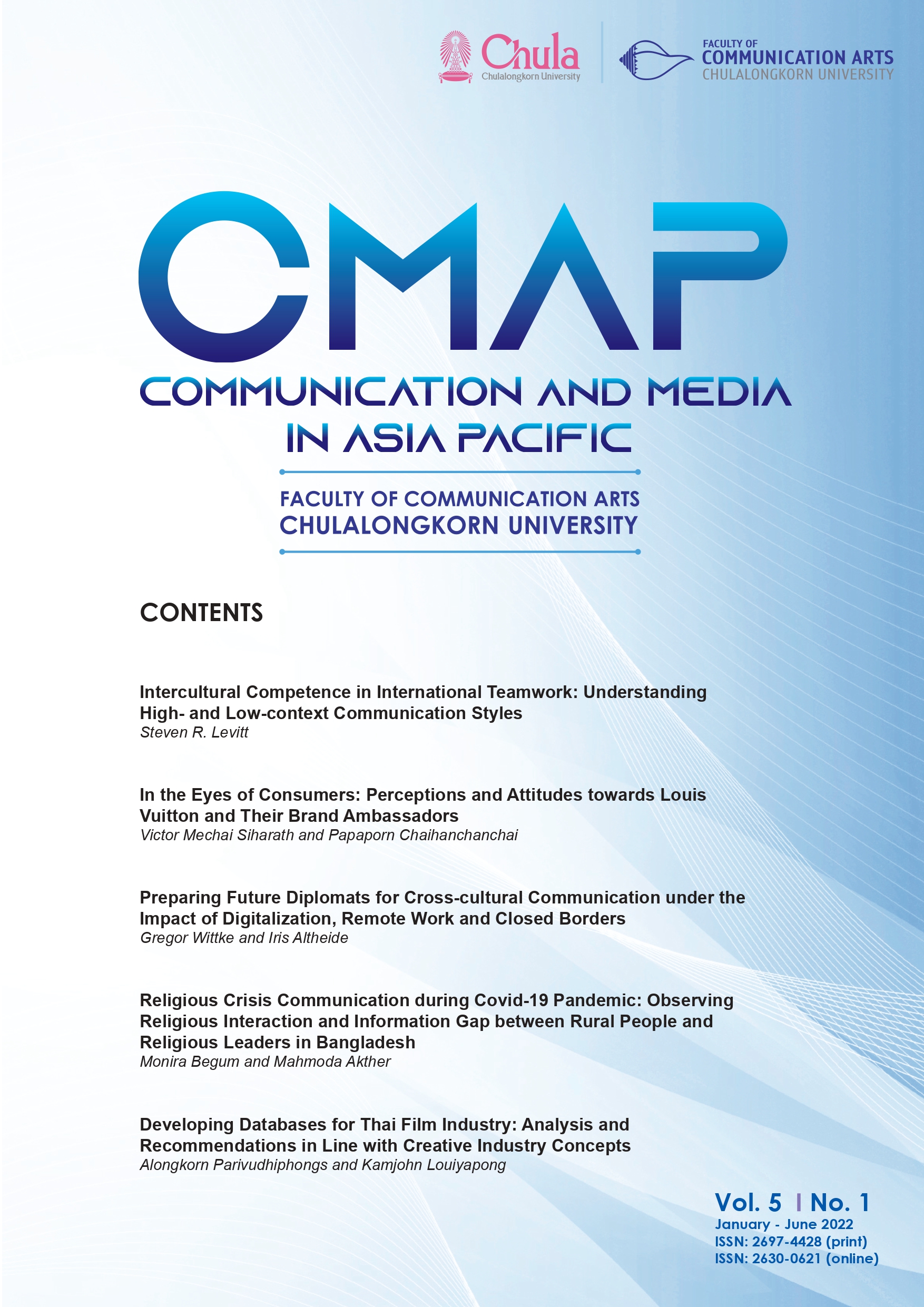Religious Crisis Communication during Covid-19 Pandemic: Observing Religious Interaction and Information Gap between Rural People and Religious Leaders in Bangladesh
Main Article Content
Abstract
Through disseminating religious beliefs and bits of advice, religious leaders can play a very significant role in creating awareness among rural people and their decision-making against any kind of crisis moment. From the very beginning of the Covid-19 pandemic surged in Bangladesh, people were informed and requested to follow all restrictions and guidelines provided by the governmental and non-governmental authorities, especially to avoid social gatherings and keep social distance everywhere, more exact at mosques. But in rural areas, most of the time people were keen to go to mosques more than other public places without taking any safety as well as ignoring distancing zone during prayer time. Giving importance to this crisis, this study feels the demand of judging the activities and interaction of religious leaders with the rural people in creating awareness during this pandemic. The first objective of this research is to find out if rural people and religious leaders maintain restrictions and guidelines provided by the authorities during the pandemic, adding more if there was any information gap among rural people and religious leaders regarding pandemic related knowledge. The second objective of this study observes if the religious leaders are well informed by the authorities’ restrictions or deluged with conservative thinking and rumors during this pandemic, and the last objective deals with the impact of religious leader’s talk on rural people in shaping their beliefs, decision making, and responses against the pandemic. This study follows rational choice theory, information gap theory, and decision-making theory besides surveying 150 rural people and a key informant interview and an in-depth interview with three respective religious leaders living in a village to meet the objectives of the study.
Article Details
References
Adetunji, A. T., & Oyekan, F. E. (2020). Organization behavior: The attitude of religious leaders in the phase of pandemic. International Journal of Psychosocial Rehabilitation, 24(10), 2993-3003.
Anshel. M. H., & Smith, M. (2013). The role of religious leaders in promoting healthy habits in religious institutions. Journal of Religion and Health, 53(4), 14-16.
Bruce, S. (1999). Choice and religion: A critique of rational choice theory. Oxford, UK: Oxford University Press.
Cheong, P. H. (2011). Religious leaders, mediated authority, and social change. Journal of Applied Communication Research, 39(4), 452-454.
de Juan, A., & Vüllers, J. (2010). Religious peace activism—The rational element of religious elites’ decision-making processes (GIGA Working paper no. 130). Hamburg, Germany: German Institute of Global and Area Studies.
Fernando, M. (2005). Religion’s influence on decision-making: evidence of influence on the judgment, emotional and motivational qualities of Sri Lankan leaders’ decision-making. The 21st European Group of Organization Studies (EGOS) Colloquium (pp. 1-17). Berlin, Germany: Freie Universitat Berlin.
Greene, T., Bloomfield, M. A. P., & Billings, J. (2020). Psychological trauma and moral injury in religious leaders during COVID-19. Psychological Trauma: Theory, Research, Practice, and Policy, 12(S1), S143–S145. https://doi.org/10.1037/tra0000641
Hage, J., & Posner, B. Z. (2015). Religion, religiosity, and leadership practices: An examination in the Lebanese workplace. Leadership & Organization Development Journal,36(4), 396-412.
Harun-Or-Rashid, M., Yoshida, Y., Rashid, M. A., Nahar, S., & Sakamoto, J. (2011). Perceptions of the Muslim religious leaders and their attitudes on herbal medicine in Bangladesh: a cross-sectional study. BMC Research Notes, 4(1), 366.
Kuriyan, N. M., Manjula, M. Y., Antony, S. (2016). Socio-religious influences on mental health associated myths and misconceptions among rural people. International Journal of Innovative Research & Development, 5(4), 99–102.
Kanmodi, K. K., & Badru, A. I. (2017). Palliative care awareness amongst religious leaders and seminarians: a Nigerian study. Pan African Medical Journal, 28(1). https://doi.org/10.11604/pamj.2017.28.259.14010
Marchau, V., Walker, W., Bloemen, P., & Popper, S. (Eds). (2019). Decision-making under deep uncertainty: From theory to practice. Cham, Switzerland: Springer.
Peter Rigii Gaitho, P. R. (2019). Influence of religion on leadership styles and leadership roles: A critical literature review. Microeconomics and Macroeconomics, 7(1), 8-11.
Phipp K. (2012). Spirituality and strategic leadership: the influence of spiritual beliefs on strategic decision making. Journal of Business Ethics, 106(2), 177-189.
Ruijs, W. L. M., Jeannine, L.A.,Hautvast, S. K., Velden, K., & Hulscher, M. (2013). The role of religious leaders in promoting acceptance of vaccination within a minority group: A qualitative study. BMC Public Health 13(1), 511.
Sato, Y. (2013). Rational choice theory. Sociopedia.isa. doi: 10.1177/205684601372
Shrivastava, S. R. B., & Shrivastava, P. S. (2020). Roping in religious leaders and faith experts in the effective containment of the coronavirus disease 2019 pandemic. Social Health Behavior, 3(3), 130-131.


